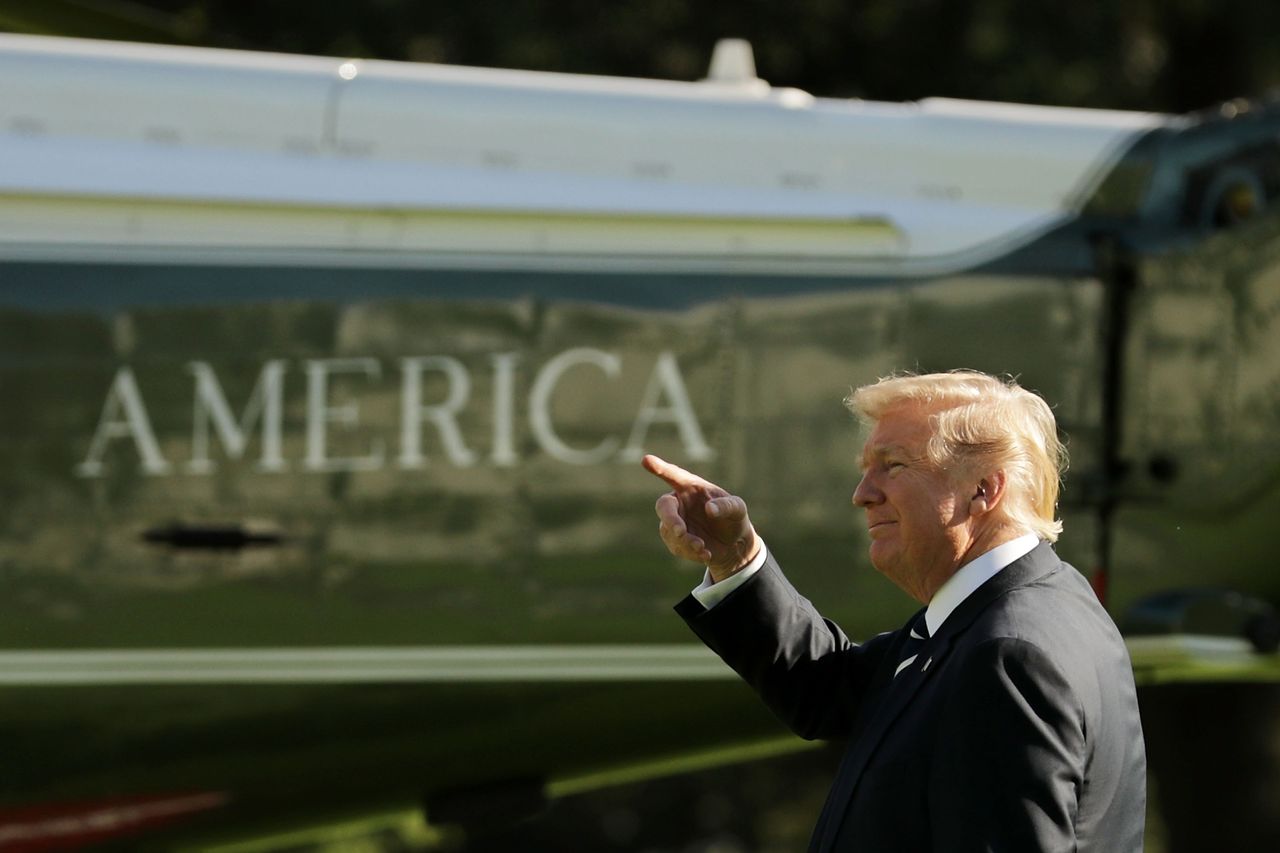The Trump era's illusion of stability
What happens when the world stops holding its breath?


Do you ever get the feeling the world is holding its breath?
When Barack Obama left office, the United States was embroiled in a number of ongoing conflicts. From the wars in Afghanistan and against ISIS and other Islamist terror groups, to the mostly frozen Korean conflict to the larger-scale geopolitical struggles with China, Russia, and Iran, the United States has numerous military and diplomatic commitments in a variety of theaters that could erupt into crisis and demand an American response. And of course the world is full of conflicts to which America is not a party, but which would inevitably draw America in, diplomatically if not militarily, if they were to escalate to full-scale war.
The Trump era has already featured a number of crises, from Saudi Arabia's blockade of neighboring Qatar to North Korea's nuclear and missile tests. But none have escalated to the point where America and the world has to reckon fully with the fact of President Trump's leadership. Trump tweets inflammatory threats that complicate American diplomacy and alarm allies and opponents alike, but so far no foreign power has backed America into the kind of corner that could produce catastrophe.
Subscribe to The Week
Escape your echo chamber. Get the facts behind the news, plus analysis from multiple perspectives.

Sign up for The Week's Free Newsletters
From our morning news briefing to a weekly Good News Newsletter, get the best of The Week delivered directly to your inbox.
From our morning news briefing to a weekly Good News Newsletter, get the best of The Week delivered directly to your inbox.
That's probably not an accident.
It has been widely reported that key members of Trump's team — Defense Secretary James Mattis, Secretary of State Rex Tillerson, National Security Adviser H. R. McMaster, and Chief of Staff John Kelly most prominently — have coordinated between themselves both to prevent the president from doing anything too disastrous, and to walk back or ameliorate the diplomatic damage he does do. Other powers may wonder whether the president is playing a "good cop / bad cop" game, as Sen. Bob Corker (R-Tenn.) suggested they might, or whether America is evolving at least temporarily into a mixed regime in which the military and permanent bureaucracy consciously usurp the prerogatives of the elected government. Either way, they have every reason to tread as cautiously as they can.
For a while, this could produce the illusion of stability, as foreign opponents press their opportunities less aggressively than they otherwise might, and allies decline to make concomitant demands, for fear of upsetting a shaky apple cart or provoking a possibly irrational administration. They might even over-read the tea leaves to justify this as something more than caution, but as patience that may be amply rewarded, as China may be doing with respect to the Korean situation.
But eventually one of two things will happen. Either the world won't be able to hold its breath any longer, and the pent-up tensions will explode — and we'll find out just what that looks like with Donald Trump as president. Or Trump will, whether in 2020 or on some other date, leave office, and the world will breathe a sigh of relief.
And what happens then?
That's the question that is probably getting too little attention given the understandable focus on the acute anxiety that Trump's presidency itself continually provokes. But it's worth asking. If those pent-up tensions don't explode, neither will they simply evaporate with the end of the Trump presidency. On the contrary, Trump's successor, whatever party he or she hails from, is likely to reap a whirlwind, particularly from allies who may feel they bent over backwards to accommodate and ignore an especially obnoxious and inconsiderate American leader, and will expect due compensation after his departure.
When President George W. Bush left office, the world's expectations of President Obama were almost astronomically high, and consequently were substantially disappointed. But the first post-Trump president will face not relief but resentment, and from day one will be negotiating from a position of weakness on matters from trade and immigration to basing arrangements, burden-sharing, and intelligence cooperation.
And this weakness will be exacerbated, domestically, by the likely reaction of the pro-Trump faction — and the GOP as a whole, if Trump's successor is a Democrat — to this likely series of reversals. If Trump manages to get through four years without catastrophe, and the dam starts to break shortly after he leaves office, he'll be the first one to tweet about how everything has gone to hell in a hand basket as soon as he left. And there will be millions of voters who will see it exactly that way.
Of course, that's a much better problem to have than for the dam to break while Trump is still president. But it's probably worthwhile for Mattis, Tillerson, and the rest of the "grownups" taking a little time out of managing the day-to-day trauma of the Trump presidency to prepare our diplomats and military leaders — and our allies — for the post-traumatic stresses that will follow.
Sign up for Today's Best Articles in your inbox
A free daily email with the biggest news stories of the day – and the best features from TheWeek.com
Noah Millman is a screenwriter and filmmaker, a political columnist and a critic. From 2012 through 2017 he was a senior editor and featured blogger at The American Conservative. His work has also appeared in The New York Times Book Review, Politico, USA Today, The New Republic, The Weekly Standard, Foreign Policy, Modern Age, First Things, and the Jewish Review of Books, among other publications. Noah lives in Brooklyn with his wife and son.
-
 6 charming homes for the whimsical
6 charming homes for the whimsicalFeature Featuring a 1924 factory-turned-loft in San Francisco and a home with custom murals in Yucca Valley
By The Week Staff Published
-
 Big tech's big pivot
Big tech's big pivotOpinion How Silicon Valley's corporate titans learned to love Trump
By Theunis Bates Published
-
 Stacy Horn's 6 favorite works that explore the spectrum of evil
Stacy Horn's 6 favorite works that explore the spectrum of evilFeature The author recommends works by Kazuo Ishiguro, Anthony Doerr, and more
By The Week US Published
-
 Why Assad fell so fast
Why Assad fell so fastThe Explainer The newly liberated Syria is in an incredibly precarious position, but it's too soon to succumb to defeatist gloom
By The Week UK Published
-
 Romania's election rerun
Romania's election rerunThe Explainer Shock result of presidential election has been annulled following allegations of Russian interference
By Sorcha Bradley, The Week UK Published
-
 Russia's shadow war in Europe
Russia's shadow war in EuropeTalking Point Steering clear of open conflict, Moscow is slowly ratcheting up the pressure on Nato rivals to see what it can get away with.
By The Week UK Published
-
 Cutting cables: the war being waged under the sea
Cutting cables: the war being waged under the seaIn the Spotlight Two undersea cables were cut in the Baltic sea, sparking concern for the global network
By The Week UK Published
-
 The nuclear threat: is Vladimir Putin bluffing?
The nuclear threat: is Vladimir Putin bluffing?Talking Point Kremlin's newest ballistic missile has some worried for Nato nations
By The Week UK Published
-
 Russia vows retaliation for Ukrainian missile strikes
Russia vows retaliation for Ukrainian missile strikesSpeed Read Ukraine's forces have been using U.S.-supplied, long-range ATCMS missiles to hit Russia
By Arion McNicoll, The Week UK Published
-
 Has the Taliban banned women from speaking?
Has the Taliban banned women from speaking?Today's Big Question 'Rambling' message about 'bizarre' restriction joins series of recent decrees that amount to silencing of Afghanistan's women
By Harriet Marsden, The Week UK Published
-
 Cuba's energy crisis
Cuba's energy crisisThe Explainer Already beset by a host of issues, the island nation is struggling with nationwide blackouts
By Rebekah Evans, The Week UK Published